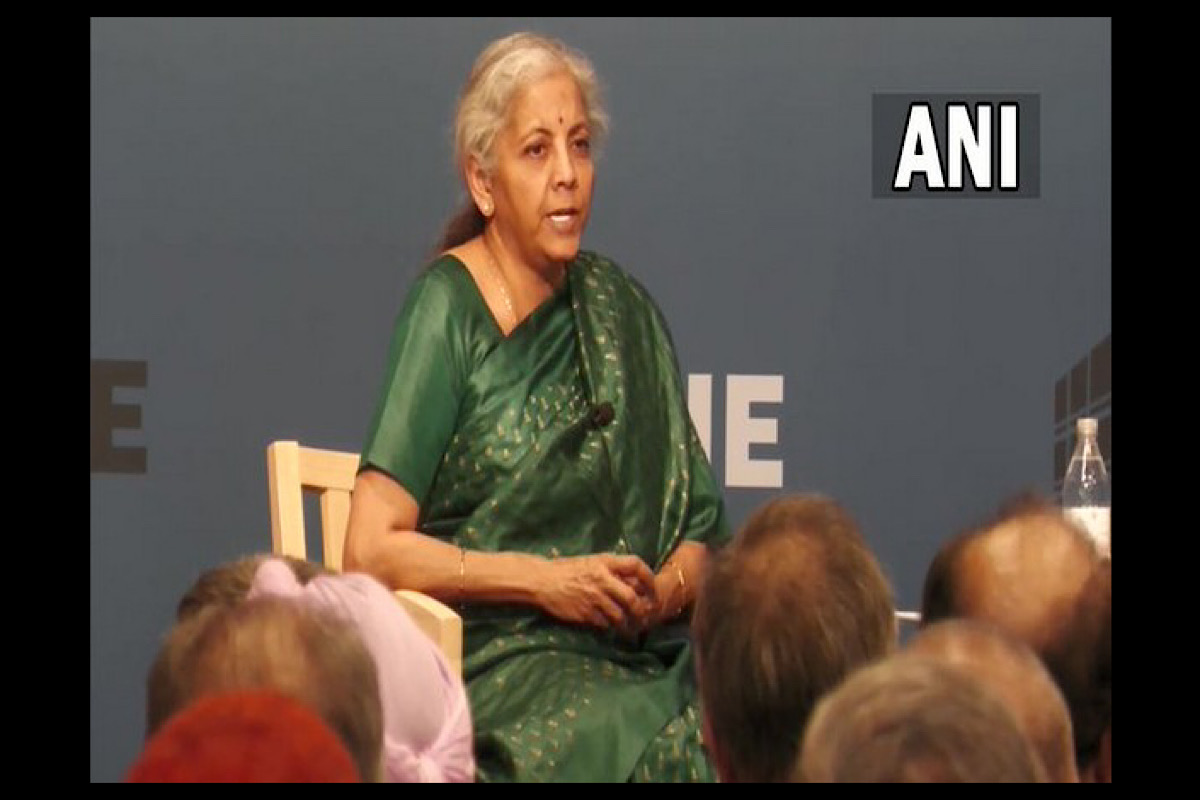Foreign investors selling Indian equities due to ‘profit booking’: Nirmala Sitharaman
Union Finance Minister Nirmala Sitharaman Monday said the foreign institutional investors (FII) are selling Indian equities lately due to the profit booking.
The condition of minorities is worsening in Pakistan and their numbers are declining by the day. Minorities in Pakistan are severely charged with minor allegations, leading to punishments like the death penalty.

Union Finance Minister Nirmala Sitharaman at PIIE, Washington DC [Photo:ANI]
Union Finance Minister Nirmala Sitharaman on Monday (local time) gave a befitting reply to the negative Western ‘perception’ of India at the Peterson Institute for International Economics (PIIE) where she was discussing the resilience and growth of the Indian economy. “I would think the answer for that lies with those investors who are coming to India, and they’ve been coming. And as somebody who’s interested in receiving investments, I would only say, come have a look at what’s happening in India, rather than listen to perceptions being built by people who have not even visited on the ground and who produce reports,” said Sitharaman while responding to PIIE President Adam S Posen on perceptions affecting investment in India or capital flows.
Posen also questioned Sitharaman that there is widespread reporting in the Western press about MPs in the opposition party losing status, and about Muslim minorities in India being subjected to violence.
Advertisement
“India has the second-largest Muslim population in the world, and that population is only growing in numbers. If there is a perception, or if there’s in reality, their lives are difficult or made difficult with the support of the state, which is what is implied in most of these write-ups, I would ask, will this happen in India in the sense, will the Muslim population be growing than what it was in 1947?” said the Finance Minister.
Advertisement
The condition of minorities is worsening in Pakistan and their numbers are declining by the day. Minorities in Pakistan are severely charged with minor allegations, leading to punishments like the death penalty. Blasphemy laws, in most cases, are used to fulfill a personal vendetta. Victims are immediately presumed guilty, even without proper investigation and holding the trial under a jury.
“As opposed to, let us say, I take the name of the country and therefore the contrast can be sharper. As opposed to Pakistan, which was formed at the same time India was divided into two – Pakistan. Pakistan declared itself an Islamic country but however said minorities will be protected. Every minority has been dwindling in its number…..decimated in Pakistan. Even some of the Muslim sects have also been decimated,” said Sitharaman.
Comparing the Muslims of Pakistan with India, she said that Muslims in India are doing better.
“Violence prevails against Muhajirs, Shia and every other group you can name which is not accepted by the mainstream. I don’t know, Sunnis probably. Whereas in India you would find every strand of Muslims doing their business, their children getting educated. Fellowships are being given by the government,” she added.
Tearing into the alleged victimization of Muslims in India, she said, “So across the board in India, if violence is happening to make Muslims get affected, itself is a fallacy as a statement. To say it’s all the blame of the Government of India, I would want to say then, tell me, between 2014 and today, has the population dwindled? Have the deaths been disproportionately high in any one particular community? So, I would rather invite these people, who write these reports to come to India. I host them. Let them come to India and prove their point.”
She further stated that emerging markets like India do carry the burden of “you are the emerging market.”
She said, “You have every business to ask us for help, or every business to speak about, every issue on which you need to play a constructive role. But yet the prescriptions are ours. I would want to ask if human that’s not to say or not to even imply that I accept the perception that you’re referring to.”
She said, “It’s the resilience of Indian people to take it upon themselves, to take the challenge and come out in their businesses despite tragedies at home, “on the revival of the Indian economy post-pandemic.
She further urged World Trade Organisation (WTO) to be more progressive.
“I would love WTO to be more progressive, a lot more listening to all countries, and more fair. It has to give space to voices of the countries which have something different to say and not just hear but also somewhat heed,” she added.
Advertisement